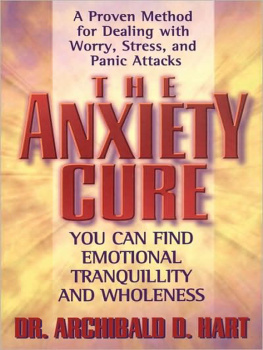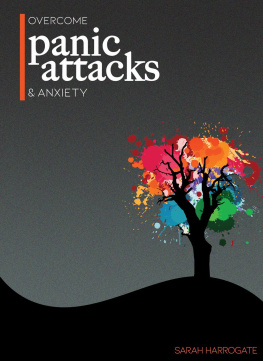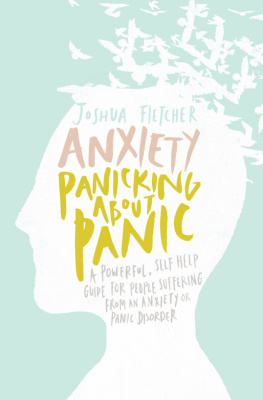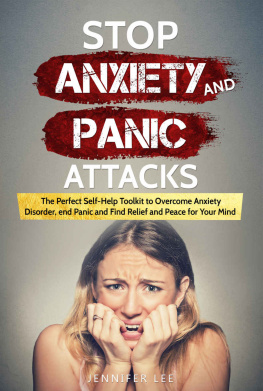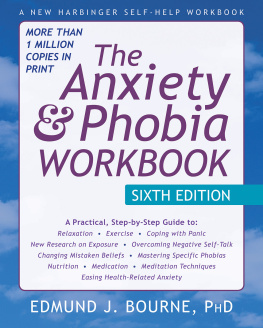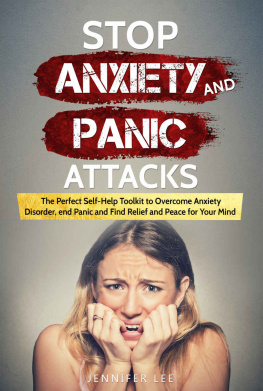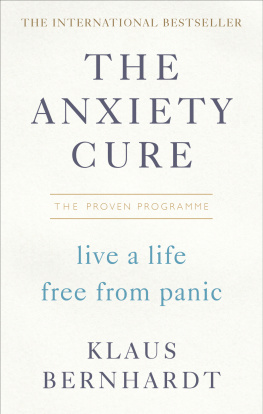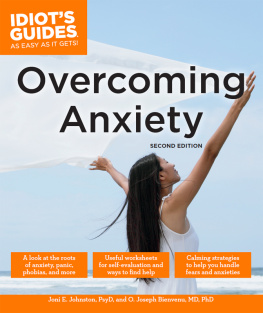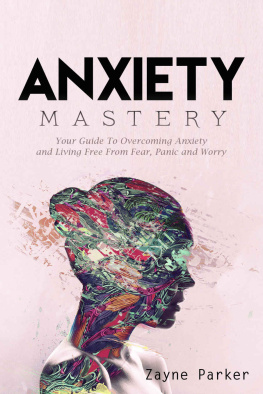Dr. Archibald D. Hart - The Anxiety Cure
Here you can read online Dr. Archibald D. Hart - The Anxiety Cure full text of the book (entire story) in english for free. Download pdf and epub, get meaning, cover and reviews about this ebook. year: 1999, publisher: Thomas Nelson, genre: Religion. Description of the work, (preface) as well as reviews are available. Best literature library LitArk.com created for fans of good reading and offers a wide selection of genres:
Romance novel
Science fiction
Adventure
Detective
Science
History
Home and family
Prose
Art
Politics
Computer
Non-fiction
Religion
Business
Children
Humor
Choose a favorite category and find really read worthwhile books. Enjoy immersion in the world of imagination, feel the emotions of the characters or learn something new for yourself, make an fascinating discovery.
- Book:The Anxiety Cure
- Author:
- Publisher:Thomas Nelson
- Genre:
- Year:1999
- Rating:3 / 5
- Favourites:Add to favourites
- Your mark:
- 60
- 1
- 2
- 3
- 4
- 5
The Anxiety Cure: summary, description and annotation
We offer to read an annotation, description, summary or preface (depends on what the author of the book "The Anxiety Cure" wrote himself). If you haven't found the necessary information about the book — write in the comments, we will try to find it.
The Anxiety Cure — read online for free the complete book (whole text) full work
Below is the text of the book, divided by pages. System saving the place of the last page read, allows you to conveniently read the book "The Anxiety Cure" online for free, without having to search again every time where you left off. Put a bookmark, and you can go to the page where you finished reading at any time.
Font size:
Interval:
Bookmark:
THE
ANXIETY
CURE
YOU CAN FIND EMOTIONAL TRANQUILLITY
AND WHOLENESS
DR. ARCHIBALD D. HART
Author of Adrenaline and Stress

THE ANXIETY CURE
1999 by Archibald D. Hart.
All rights reserved. No portion of this book may be reproduced, stored in a retrieval system, or transmitted in any form or by any meanselectronic, mechanical, photocopy, recording, scanning, or otherexcept for brief quotations in critical reviews or articles, without the prior written permission of the publisher.
Published in Nashville, Tennessee, by Thomas Nelson. Thomas Nelson is a registered trademark of Thomas Nelson, Inc.
Thomas Nelson, Inc. titles may be purchased in bulk for educational, business, fund-raising, or sales promotional use. For information, please e-mail SpecialMarkets@ThomasNelson.com.
All names have been changed to protect the privacy of the individuals.
Unless otherwise indicated, Scripture quotations used in this book are from the King James Version of the Bible (KJV).
Other Scripture references are from the following sources:
The Holy Bible, New International Version (NIV). 1973, 1978, 1984, International Bible Society. Used by permission of Zondervan Bible Publishers.
The New King James Version (NKJV), 1979, 1980, 1982, Thomas Nelson, Inc., Publishers.
New American Standard Bible (NASB), 1960, 1977 by the Lockman Foundation.
Library of Congress Cataloging-in-Publication Data
Hart, Archibald D.
The anxiety cure / by Archibald D. Hart.
p. cm.
Includes bibliographical references.
ISBN 978-0-8499-4296-9 ( tradepaper)
ISBN 978-0-8499-1532-1 (hardcover)
1. AnxietyReligious aspectsChristianity. 2. Peace of mindReligious aspects Christianity. I. Title.
BV4908.5.H35 1999
152.4'6dc21
99-32884
CIP
Printed in the United States of America
08 09 10 11 12 QW 23 22 21 20 19
CONTENTS
Chapter 5 When and How to Use Antianxiety
Medications
Appendix A How to Order Dr. Harts Relaxation
Training Tape
A nxiety is now the number one emotional problem of our day. Panic anxiety is the number one mental-health problem for women in the United States, and it is second in men only to substance abuse. Many anxious people also suffer from other emotional problems, notably depression. Anxiety and depression go together like Jack and Jill. Clinically, the two are sometimes very difficult to separate.
If you suffer from anxiety or know of someone who is suffering from anxiety, this book is for you. If you are in a high-pressure job and want to prevent anxiety problems from developing, this book is also for you. Prevention is always better than the cure.
I have one fundamental message in this book: Tranquilizers alone will not cure your anxiety problems. Is this important? It certainly is.
Why is this important? First, some amazing discoveries have taken place over the last few years that have revolutionized our understanding of what causes anxiety. I dont just mean the rejection of the archaic idea that all anxiety is just in your head. This has been obsolete for some time now. The modern scientific understanding of anxiety has gone beyond this. While a few die-hard psychologists still cling to the idea that all anxiety is purely a mental phenomenon (and therefore anxiety sufferers must spend the rest of their lives in some form of therapy), we now know that a lot of anxiety is biologically based. Notice, I didnt say all anxiety is biologically based. For example, the sort of anxiety that the Bible talks about, which is more akin to worry, is probably a learned behavior that goes back to the earliest part of life. But the anxiety that is rampant in our society today does not necessarily come from excessive worry or bad childhood experiences. In fact, most of the patients I see report a perfectly normal childhood. They are usually extremely competent people.
In recent years, researchers have discovered just how much of our modern-day anxiety is being caused by stress. Stress not only causes headaches, ulcers, and heart disease, it also sets the stage for anxiety by wreaking havoc with the brains biochemistry. This is why the most frightening increase in anxiety problems has occurred in highly functioning executives, women, pastors, and leaders, the very group who are the most overstressed.
The reason we are seeing such a dramatic rise in stress disease, anxiety, and clinical depression in modern times is not too difficult to discern. Humans were designed for camel travel, but most people are now acting like supersonic jets. In a nutshell, most of us are living at too fast a pace. Our adrenaline is a continuous stream of supercharged, high-octane energy. And, as with any vehicle running on high-octane fuel, we usually burn out quickly. If you really want to know why you are so stressed-out, consider the fact that you, like many others, are too hurried, hassled, and overextended. The pace of modern life is stretching all of us beyond our limits. And we are paying for this abuse in the hard and painful currency of stress and anxietyplain and simple.
So the formula for understanding this book is simple: High adrenaline, caused by overextension and stress, depletes the brains natural tranquilizers and sets the stage for high anxiety.
The connection between stress and anxiety disorders has been grossly overlooked, which has made it almost impossible for anyone to totally cure their anxiety. Without a proper understanding of the adrenaline-anxiety connection, many people simply rely on medication to control their anxiety. But let me be clear: Overdependence on artificial tranquilizers does not cure anxiety. Medication only relieves the symptoms of anxiety; it does not address the cause.
Perhaps the most important aspect of our recent discoveries is the fact that the brain has its own system of natural tranquilizers. But only one of these natural tranquilizers is similar to the benzodiazepines, the most commonly prescribed form of antianxiety medications available to us today. This means we cannot rely solely on artificial tranquilizers to fix our anxiety problems. We have to address the problem at its source, the disruption to these delicate hormones that is caused by roller-coaster, fast-track living.
Although artificial tranquilizers are effective in ameliorating anxiety symptoms in the short term, they dont cure the anxiety permanently. Further, modern tranquilizers are highly addictive. Your brain becomes dependent on them; before you can break this dependency, you have to restore the natural production of your brains own tranquilizers, else all hell will break loose in your brain. Your brain can be as rebellious as any incorrigible child.
Something else has to change if you are going to cure your anxiety and not depend on artificial tranquilizers the rest of your life. It is this something else that you learn all about in the following pages. In fact, from my experience in treating anxiety problems, I am convinced that if you suffer from high anxiety, there is only one long-term answer to your problem: You have to make some significant life changes. This is not to say that antianxiety medications dont have their place. They do. I recommend them often. But they are only interim solutions that must be followed by long-term changes if you want to be free of troubling anxiety. So, we have a lot of work to do together in this book.
By the way, lest you think I only know about anxiety secondhand through my patients, think again. I hasten to confess that I am the chief of sinners in this area. Thats why I know all about this subject. I was an adrenaline junkie for a long time, and I can easily backslide. I love challenges and thrive on crises. There is never enough time in any day for me to do all I want to. Life is too short, too precious, and full of too many opportunities to be lived halfheartedly, so I pull out all the stops. I have little tolerance for anything that blocks my progress. I know this problem personally, but I also have discovered the answers to overcome anxiety. I have effectively put into practice the advice I offer to you in the following pages.
Next pageFont size:
Interval:
Bookmark:
Similar books «The Anxiety Cure»
Look at similar books to The Anxiety Cure. We have selected literature similar in name and meaning in the hope of providing readers with more options to find new, interesting, not yet read works.
Discussion, reviews of the book The Anxiety Cure and just readers' own opinions. Leave your comments, write what you think about the work, its meaning or the main characters. Specify what exactly you liked and what you didn't like, and why you think so.

